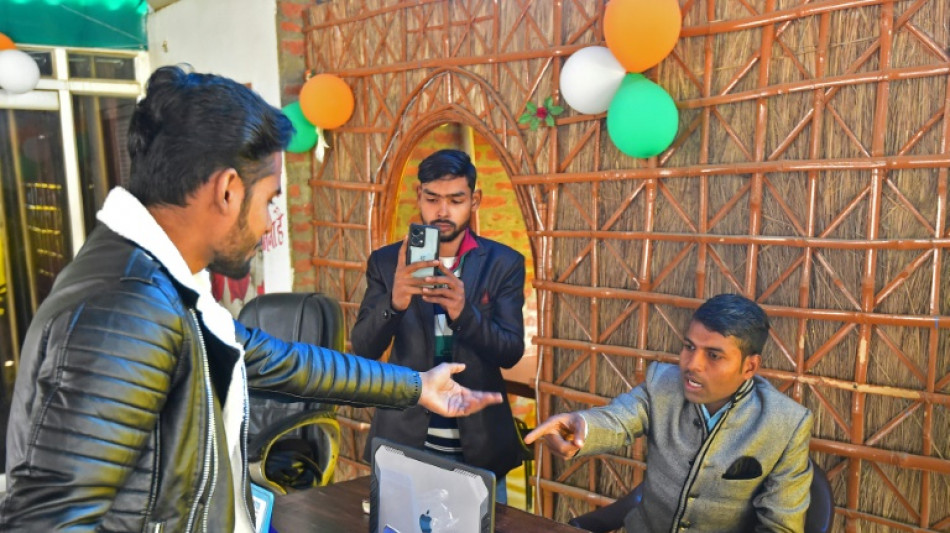
-
 Israel president says antisemitism in Australia 'frightening'
Israel president says antisemitism in Australia 'frightening'
-
Trump orders Pentagon to buy coal-fired electricity

-
 Slot hails 'unbelievable' Salah after matching Liverpool assist record
Slot hails 'unbelievable' Salah after matching Liverpool assist record
-
Von Allmen joins Olympic ski greats, French couple win remarkable ice dance

-
 Guardiola eyes rest for 'exhausted' City stars
Guardiola eyes rest for 'exhausted' City stars
-
US pushes for 'dramatic increase' in Venezuela oil output

-
 France's Cizeron and Fournier Beaudry snatch Olympic ice dancing gold
France's Cizeron and Fournier Beaudry snatch Olympic ice dancing gold
-
Man City close on Arsenal, Liverpool end Sunderland's unbeaten home run

-
 Van Dijk sinks Sunderland to boost Liverpool's bid for Champions League
Van Dijk sinks Sunderland to boost Liverpool's bid for Champions League
-
Messi out with hamstring strain as Puerto Rico match delayed

-
 Kane helps Bayern past Leipzig into German Cup semis
Kane helps Bayern past Leipzig into German Cup semis
-
Matarazzo's Real Sociedad beat Athletic in Copa semi first leg

-
 Arsenal stroll in Women's Champions League play-offs
Arsenal stroll in Women's Champions League play-offs
-
Milei labor law reforms spark clashes in Buenos Aires

-
 Bangladesh's political crossroads: an election guide
Bangladesh's political crossroads: an election guide
-
Bangladesh votes in landmark polls after deadly uprising
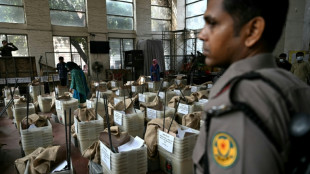
-
 US stocks move sideways after January job growth tops estimates
US stocks move sideways after January job growth tops estimates
-
Man City close in on Arsenal with Fulham cruise

-
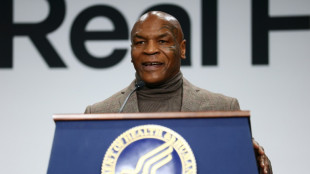 Mike Tyson, healthy eating advocate for Trump administration
Mike Tyson, healthy eating advocate for Trump administration
-
LA 2028 Olympics backs chief Wasserman amid Epstein uproar

-
 Brighton's Milner equals Premier League appearance record
Brighton's Milner equals Premier League appearance record
-
Seahawks celebrate Super Bowl win with title parade

-
 James Van Der Beek, star of 'Dawson's Creek,' dies at 48
James Van Der Beek, star of 'Dawson's Creek,' dies at 48
-
Scotty James tops Olympic halfpipe qualifiers as he chases elusive gold

-
 Swiatek, Rybakina fight back to reach Qatar Open quarter-finals
Swiatek, Rybakina fight back to reach Qatar Open quarter-finals
-
Trump tells Israel's Netanyahu Iran talks must continue

-
 England to face New Zealand and Costa Rica in pre-World Cup friendlies
England to face New Zealand and Costa Rica in pre-World Cup friendlies
-
'Disgrace to Africa': Students turn on government over Dakar university violence

-
 Simon in credit as controversial biathlete wins Olympic gold
Simon in credit as controversial biathlete wins Olympic gold
-
McIlroy confident ahead of Pebble Beach title defense

-
 US top official in Venezuela for oil talks after leader's ouster
US top official in Venezuela for oil talks after leader's ouster
-
Ukraine will only hold elections after ceasefire, Zelensky says

-
 WHO urges US to share Covid origins intel
WHO urges US to share Covid origins intel
-
TotalEnergies can do without Russian gas: CEO

-
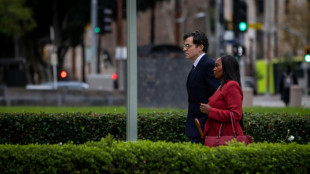 Instagram CEO denies addiction claims in landmark US trial
Instagram CEO denies addiction claims in landmark US trial
-
Israel's Netanyahu pushes Trump on Iran

-
 EU leaders push rival fixes to reverse bloc's 'decline'
EU leaders push rival fixes to reverse bloc's 'decline'
-
BMW recalls hundreds of thousands of cars over fire risk

-
 Norris quickest in Bahrain as Hamilton calls for 'equal playing field'
Norris quickest in Bahrain as Hamilton calls for 'equal playing field'
-
Colombia election favorite vows US-backed strikes on narco camps

-
 French court to rule on July 7 in Marine Le Pen appeal trial
French court to rule on July 7 in Marine Le Pen appeal trial
-
Jones says England clash 'perfect game' for faltering Scotland

-
 Norway's ex-diplomat seen as key cog in Epstein affair
Norway's ex-diplomat seen as key cog in Epstein affair
-
Swiatek fights back to reach Qatar Open quarter-finals

-
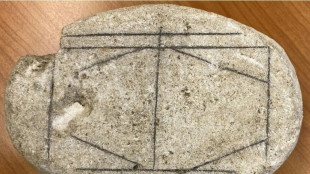 AI cracks Roman-era board game
AI cracks Roman-era board game
-
Motie spins West Indies to victory over England at World Cup

-
 NBA bans 4 from Pistons-Hornets brawl, Stewart for 7 games
NBA bans 4 from Pistons-Hornets brawl, Stewart for 7 games
-
Shakira to rock Rio's Copacabana beach with free concert

-
 Cyclone batters Madagascar's second city, killing 31
Cyclone batters Madagascar's second city, killing 31
-
Stocks spin wheels despite upbeat US jobs data


Staged online videos feed Islamophobia in Modi's India
The acting is dire and the scenarios fake, but staged videos are peddling disinformation and fanning sectarian tensions in India, which has seen rising Hindu radicalisation under nationalist Prime Minister Narendra Modi.
One such five-minute film purported to show a Muslim man mixing toilet cleaning liquid into a street snack, before being "confronted" by passersby. The video got more than five million views on Facebook.
Another, seen more than 3.5 million times on YouTube, depicts a fruit-seller -- a trade taken up by many Muslims -- cheating customers out of pomegranates before being accosted and assaulted.
"Before buying anything from Muslim Jihadis, watch this video of a Muslim fruit seller," the accompanying caption says.
- Millions of followers -
Asked about the impact their work may have, the video-makers say the clips are just meant as "entertainment" -- and to make money.
The toilet cleaning liquid video was made by Narendra Verma, who has a Facebook page with 55,000 followers and runs a successful YouTube channel.
The smartly dressed 28-year-old told AFP that his videos can make his six-member team 250,000 Indian rupees ($3,000) a month from YouTube and Facebook, depending on how many views they get.
"Everyone has different responsibilities, from writing the script of the video to shooting it and later editing and uploading it," he said.
"We make these videos (to make) people aware so that they can avoid such incidents happening for real in society," he added.
Raju Bharti runs a YouTube channel with 2.89 million subscribers and has uploaded hundreds of videos, including the one of the "Muslim fruit-seller". He denies accusations of inciting hatred.
"We make videos about digital fraud, child kidnapping and how shopkeepers or hawkers cheat common people," he told AFP.
"Our aim is not to hurt the sentiments of any religion or community, we just want to make people aware."
- 'Hindu brothers' -
Experts say videos like these are shared widely to reinforce negative stereotypes and conspiracy theories about the roughly 210 million Muslims in the world's most populous country.
One with 1.2 million views features a man disguised in a burqa -- a garment worn by some Muslim women -- being pursued with a "stolen" child under his arm.
"Burqa hides terrorist activities. Burqa promotes crime. Burqa should be banned in India," the caption reads.
Others show Hindu women who have supposedly been duped into marrying a Muslim, a common trope with the Hindu far-right.
These videos are often included in social media campaigns to economically boycott or attack Muslims, or when communal tensions flare.
"Wake up... Hindu brothers and sisters, wake up now or never, the economic boycott is the only option for these Jihadis," one user wrote in response to the toilet cleaning liquid clip.
- Disclaimers -
Some content-makers took down their videos after they went viral and were subsequently debunked by AFP and other fact-checking organisations.
When his toilet cleaning liquid video exploded, Verma started getting calls from the media and had to speak to the police.
He was "scared", he said, and has since switched to more innocent themes, like pranks or dancing.
Some producers try to circumvent social media rules by posting quickly disappearing "disclaimer" messages that the content is staged.
Producers then class the videos as "entertainment" on social media, said Paranjoy Guha Thakurta, a journalist, author and film-maker who tracks misinformation and hate speech.
"This is the real loophole... Even after being shared with a false claim, they can spread misinformation by just putting a disclaimer," he said.
When videos are taken down, they can often reappear.
- 'Significant steps' -
Asked about the videos mentioned in this story, Facebook parent company Meta said it was investigating them. YouTube, Twitter and the Indian government did not respond to requests for comment.
"We don't allow hate speech on our platform, and we remove it when we find it or are made aware of it," Meta said in an emailed statement.
Meta said it removes content that violates "Community Standards", reducing the distribution of stories marked as false by third-party fact-checkers, and "informing people so they can decide what to read, trust and share".
One of Facebook's partners is AFP, which has a global team of journalists, including in India, who debunk misinformation as part of Meta's third-party programme.
AFP debunked the toilet cleaning liquid video as "false information" on Facebook, marking posts sharing the video as such.
As per Facebook policy, those posts received lower distribution and were linked to AFP's article debunking them.
However, keyword searches on Facebook and other social media platforms found several posts containing the video still available.
Thakurta said that many Indians often like and share videos that confirm their biases, without checking their veracity.
"We need to cultivate social awareness among people. Social media awareness... (has) to be a part of our education syllabus," he told AFP.
He added that while laws to regulate social media existed, they were not effectively implemented in a country of 1.4 billion people and 600 million smartphones.
"These (social media platforms) are being used or misused to spread Islamophobia and hate against Muslims in India," he said.
T.Ibrahim--SF-PST



